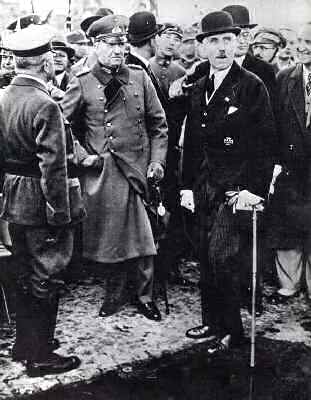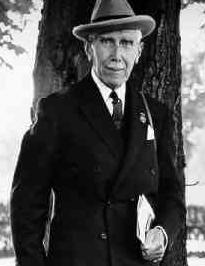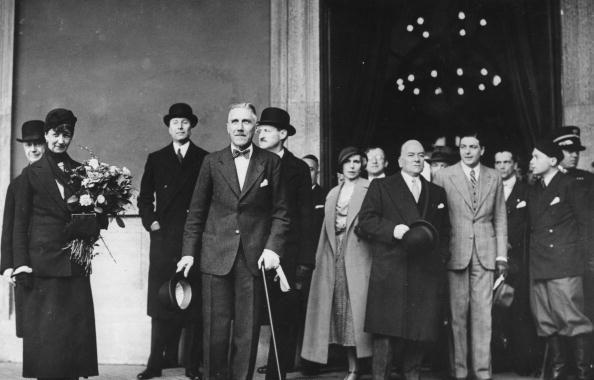Franz von Papen
From Kaiserreich
Franz Joseph Hermann Michael Maria von Papen (born in October, 29 1879 at Werl, Germany) is a German politician. After years of service within the German diplomacy, mainly as State Secretary for Foreign Affairs, he succeeded Generalfeldmarschall Oskar von Hutier is his office of German Reichskanzler after the latter's fatal disease. Since June, 1 1934, Franz von Papen is the tenth and current Imperial Chancellor of Germany, thus head of the government of one of the most powerful countries in the world.
Contents |
Biography
Before the Weltkrieg
Son of Friedrich Franz Michael von Papen and Anna Laura von Steffens, wealthy Westphalian Catholic landowners, Franz von Papen was educated as an officer, attending various military schools, to the Bensberg Cadet Academy, from 1891 to 1895, and in the Lichtenfelder Military Academy from 1895 to 1898, where he took advantage from the nearness to Berlin to visit regularly the city museums and theatres. He then chose to join the cavalry, entering Dusseldorf Cavalry School in 1898, commissionned to the 5th Westphalian Uhlan regiment, stationed in Dusseldorf. Trained as a lancer, he then went to the Hanover Cavalry Riding School in 1902, spending a lot of time in England. After his wedding with Martha von Boch-Gelbau in 1905 and the birth of his first daughter, he then pursued his ambition of entering the Great General Staff, finally managing to enter the Berlin Staff Academy in 1908, selected along with 150 other young officers for a trial period in April 1911, being exposed to the theories of military writer Friedrich von Bernhardi. In 1913, Papen completed his training and was promoted captain, and soon afterwards named as military attaché to USA and Mexico, arriving in the first country in January 1914, and observing the Mexican Revolution. He was returned at Washington D.C. then the Weltkrieg broke out.
Weltkrieg
Although it has always been denied by Von Papen himself, he reportedly acted as a spymaster while in the United States, organizing economic espionage against Allied war efforts in Europe by means of attempting to purchase all available explosive substances, to prevent their use against the German war effort. On December 28, 1915, after the RMS Lusitania incident he was declared persona non grata by the U.S. after his exposure and recalled to Germany. En route, his luggage was confiscated, and 126 check stubs were found showing payments to his agents. Papen went on to report on American attitudes to both General Erich von Falkenhayn and the Emperor Wilhelm II. In April 1916, a United States federal grand jury issued an indictment against Papen for a plot to blow up Canada's Welland Canal, which connects Lake Ontario to Lake Erie, but Papen was safely on German soil; he remained under indictment until he became Reichskanzler, at which time the charges were dropped. During the Weltkrieg, Papen served as an officer first on the Western Front and then from 1917 as an officer on the Grosser Generalstab in the Middle East and as a major in the Ottoman army in Palestine, and later as colonel during the Italian offensive. Papen also served as intermediary between the Irish rebels and the German government regarding the purchase and delivery of arms to be used against the British during the Easter Rising of 1916, as well as serving as an intermediary with the Indian nationalists. After achieving the rank of colonel, he returned to Germany and left the army in 1920.
Hot spot ambassador
Entering diplomacy, Von Papen was appointed German consul in Dublin by the then Foreign Minister, Arthur Zimmermann. He worked there as an undercover agent, creating links between the German Secret Services and the Irish nationalists, due to his previous work during the 1916 Easter Rising: the 1922 Irish successful rebellion would have certainly not succeeded without German support and the work of Von Papen.
As a prominent Roman Catholic diplomat, he was sent to Italy, who had not experienced yet the Neo-Guelph coup that put Pope Pius XI as head of the Italian Federation; was von Papen's mandate in Rome determinant in the achievement of this coup? The only official major achievement of ambassador von Papen was the signature of a Concordate between the Catholic Church and Germany. After two years in Rome, Franz von Papen was sent for another two years in the newly established Princely Federation, enhancing links between the German Empire and one of the Indian states : von Papen was recalled in Germany after having provocated a scandal in Hyderabad due to a refusal of another Indian proposal for Ceylan's purchase.
Shortly before Zimmermann's retirement from political matters in 1928, the latter made a gallant last stand against the United States, by naming Franz von Papen German minister to Washington D.C., while he was still under indictment for U.S. judicial system. Protected by his diplomatic immunity, von Papen restablished relations between Germany and the United States, which had been weakened since the end of the Weltkrieg. Some of his criticizers pointed his role in the 1929 German insider dealing (then German investments in the United States were cancelled shortly before the 1929 New York Stock Market crash) and the quick rising of German-born Fritz Kuhn as a prominent figure within the national-populist America First Union Party.
State Secretary for Foreign Affairs
Marshal Oskar von Hutier, being named Reichskanzler after von Tirpitz's death in 1930, wanted to reinforce links of the German Imperial government with the Roman Catholic electors in Bavaria and Rhineland: as a consequence of this choice, Franz von Papen was chosen to be State Secretary for Foreign Affairs of the von Hutier cabinet. The nomination of von Papen was a subject of strained debate in Germany: normally considered as a Zentrum politician, von Papen "betrayed" (to follow the words of Heinrich Brüning) his Catholic fellows by spousing the political interests of the ruling Prussian nobility. Von Papen's duty as Foreign minister was determinant for the creation of the Allgemeine Ostasiatische Gesellschaft in southern Asia and the normalization of the relations with Russia and the Commune of France. Adopting a firm stance against the spreading of Syndicalism throughout the world, von Papen rallied most of the nationalist politicians to his policies, easily becoming Member of Parliament for Westphalia in a landslide victory during the 1931 German legislative election. Even if the SPD affirmed that his action only helped to strengthen the national-populist political formations in Germany and throughout the world, von Papen was one of the favorites when Reichskanzler von Hutier suddenly died in 1934.
Reichskanzler : incoming challenges

Running against Reichstag Speaker Otto Meissner for Reichskanzler's office, Franz von Papen was named as the tenth Reichskanzler of the German Empire by the Kaiser on June, 1 1934. The new head of the German government kept most of the ministers of the past von Hutier administration. During his inauguration speech in front of the Reichstag, von Papen pledged to "protect the interests of the Reich everywhere, everytime and against everyone" and to "destroy the demons of Syndicalism and Marxism wherever they hide". Shortly after, the growing slump of the Berlin Stock Market convinced him to adopt a policy of cash flow for the German companies, which was irrelevant for resolving the incoming recession. The too rapid expansion of the German Empire begins to show its terrible effects for German economy, and von Papen knows that he will be judged on his economic deeds.
Another great subject of disappointment for the Reichskanzler is the army. General Kurt von Schleicher, formerly known as one of von Papen's best allies within the military, came as the spokespman of a fringe of young officers protesting against the current Defence policy, pointing the lack of reaction against the troubles in Russia and at the French-German border, calling for a reinforcement of the Siegfried Line in Alsace and a quick modernization of the German army, in particular in terms of mechanized material, as proposed by General Heinz Guderian. If such proposals are denied by the aging leaders of the German Staff, Hans von Seeckt and August von Mackensen, the friendship of von Schleicher with the Kronprinz Wilhelm placed the General as a rival for von Papen, and as a possible successor.
Political career
- Military attaché to United States and Mexico (1913-1916)
- German ambassador to Dublin, Ireland (1919-1922)
- German ambassador to Rome, Italian Federation (1923-1925)
- German ambassador to Hyderabad, Princely Federation (1925-1927)
- German ambassador to Washington D.C., United States (1927-1930)
- State Secretary for Foreign Affairs (1930-1934)
- Member of Parliament for Westphalia (1931-...)
- Imperial Chancellor of Germany(1934-...)
Papen's cabinet June, 1 1934 - ...
- Franz von Papen - Imperial Chancellor
- Count Friedrich Werner von der Schulenburg - State Secretary for Foreign Affairs
- Hans von Seeckt - State Secretary for War, Chief of the German General Staff
- Count Johann Heinrich von Bernstorff - State Secretary for Interior
- Hjalmar Schacht - State Secretary for Finance
- Count Johann Schwerin von Krosigk - State Secretary for Economics and Labour
- Ernst Trendelenburg - State Secretary for Justice
- Ludwig von Reuter - State Secretary for Navy, Commander of Kaiserliche Marine
- Hermann Goering - Statthalter of Freistaat Mittelafrika
- Alexander von Falkenhausen - Governor General of Allgemeine Ostasiatische Gesellschaft
- Carl Friedrich Goerdeler - Spokesman of the government
Personal life
The Reichskanzler has 4 siblings and married Martha von Boch-Galbau in May 1905, daughter of a wealthy industrialist: together, they had five children: Antoinette (born in 1906), Isabella, Margaret, Friedrich Franz and Stephanie Marie Antoinette.


